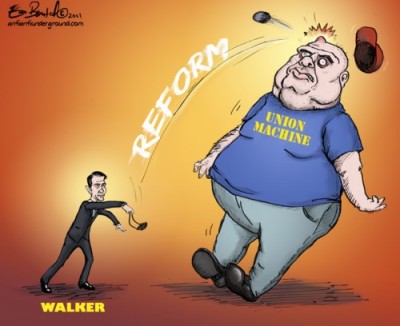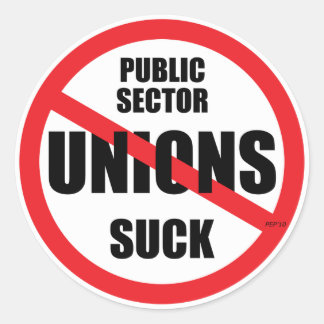
When the Berlin Wall fell, when the USSR disbanded, when Communism was consigned once and for all to the ash-heap of history, the conservative movement lost a common enemy.
The end of one era gave way to the "Seinfeld" decade of the 1990's, which was a whole lot of nothing. Democrat Bill Clinton shifted to the center, proclaiming himself a "New Democrat", and the end of the era of "Big Government". With a strong Republican opposition in Congress for the first time in forty years, the 1990's witnessed welfare reform and a balanced budget, limited military exercises in the vulcanized Balkans.
The Republican Party held onto Congressional power throughout the 1990s until 2007, when similar accusations of internicine corruption brought down Republicans. For the first time in nearly two decades, Democrats came to power.
Why did the Republican brand go bland? Republicans turned into "Big Government", spending more money under Bush than under Clinton. A balanced budget in 1999 and 2000 turned into deficits every year. One-party Republican rule yielded two wars in Iraq and Afghanistan, rapidly increased spending for the military, homeland security, and pork for all. The 2001 No Child Left Behind law has left plenty of children behind. The culture of test-taking may test the resolve of our society, whether students who excel at K-12 test-taking will excel in anything else. President Bush wanted to keep Florida quadriplegic Terry Schiavo alive, despite the wishes of her husband and the constraints of Federalism. The 2005 Transportation bill had the Bridge to Nowhere, and the Republican principles of fiscal conservative, limited government, and Constitutional rule were nowhere to be found.
Medicare Part D expanded subsidies for seniors, and the national debt. How much corporate welfare was tossed around during that time, as well, Big Farm (Agribusiness) and Big Pharma, and Big Army (military spending) exploded. Everyone loves tax cuts, but increased spending and easy credit fueled inflation and expanded investment bubbles. "Tax and spend" was replaced with "Spend and spend". Government infusing of debt-driven spending turns into a tax increase when the wealth of one's savings and earnings diminished as a result. Housing prices rose until the breaking point of Big Banks made Too Big began to fail. "We must suspend the rules of the free market in order to save it," said Bush. With this mixed message in one sentence, Bush explained why the Republican Party went from majority to minority. They believed in all the right things, but they did not do them. This division between sentiment and certainty plagues the GOP, since Democrats promise to spend more, and do so. Even though rational voters know that deficits and debt are wrong, they acknowledge that the Democrats were never betraying their core principles.
 |
| Wisconsin Governor Scott Walker slays the Public Sector Union Goliath |
Politics requires an enemy to drive the ambitions of leaders. Without communism, which represented the ideals of democratic-socialism drive to the extreme, the Republican Party had not direction, no reason to expound limited government as a cause, since there was no opposing cause to rail against.
Conservatives need a new enemy. For free markets and limited government to rejoice in resurgence, Republican leaders must adapt these adopted values as an attack against a common foe.
Conservatives want limited government. They need to portray the state as the enemy. Yet more people are receiving stipends, subsidies, and other salaries from the state. Conservatives need a populist message, but attacking Washington has not worked. The National government can spend money because it can print money. States have to balance their budgets, states face economic turmoil because they cannot paper over their problems. Washington takes to give, while state capitals have to work with what they have within their boundaries.
Conservatives care about getting government out of the lives of the people, and care about the rule of law and tradition as opposed to new rights, rules, and regulations advanced by the state.
What new enemy can unite conservatives in the same confrontational manner as Communism?
Public Sector Unionism.
Public Sector unions are the antithesis of limited government. More state workers result from growing bureaucracies, which are funded and staffed by public sector unions. The same interests which organize and collectively bargain take money from the workers' paychecks and funnel the money to candidates and causes which will keep the money flowing. Rhode Island is the most indebted nation in the union, one which has labored under one-party rule for over seventy years. The Pension obligations in Rhode Island are the most burdensome in the country. Even Democratic Treasure Gina Raimondo had no choice but to declare that everyone in Rhode Island, public and private, retired and working, will have to take a cut, or the state will have to cut everything to pay current pension obligations.
 |
Public sector unions do not represent nor respect the individual citizen nor the people. In fact, they have a storied history and documented record of hurting working class individuals. Labor unions support minimum wage laws, which limits new workers' opportunities to find entry level employment. Unions use force to distort markets and trade. The ILWU celebrates "Bloody Thursday" every year, commemorating their hostile takeover of San Francisco, plus the scattered deaths of "scabs" outside of the Port of Los Angeles. One young student sounded like an indoctrinated drone, a born-hater of employers and shipping interests. I have spoken first hand with longshoremen who have been intimidated by their superiors because they vote for Republican candidates. Another employee, a Reagan Democrat, has grown disillusioned with the growing insolence of ILWU staff. Just three months, Port of LA clerks went on strike, hobbling national trade for a week.When the Aviation Safeguards Association broke away from the SEIU, they earned higher wages. Right-to-work states have lower unemployment. The Republican Party's Free market message resonates with populist overtones.
Public sector unions resist reform and discourage change and choice. Teachers unions protect the worst teachers but refuse to promote the best. The teachers unions helped kill Prop 32, which would protect the paycheck and vote of every Californian working in the public sector. Democrats and Republicans (and one crucial independent named Bill Bloomfield) supported Prop 32. This unifying interest may be the catalyst for a long-awaited realignment in the political party structure. The SEIU is on record intimidating legislators. The Torrance Police Department broke up a protest a few years ago.
Public sector unions are losing power. Wisconsin governor Scott Walker passed Act 10, which prevented public sector unions from withdrawing dues from employees' checks, limited collective bargaining to wages, and opened up negotiations for school districts and city managers to contract out health care plans. The reforms worked so well, Walker's recall opponent Tom Barrett, the mayor of Milwaukee, used those reforms to save $21 million dollars. He could not argue against the reforms, but merely tagged Walker with "Rock Star of the Far Right". Walker beat the recall by a greater margin than his 2010 election.
Walker's reforms have inspired and played off other reforms. Michigan initiated Right to Work legislation, as did Indiana (which has also passed a statewide voucher program). These states are the models for a new and resurgent combative (not compassionate) conservatism.
The Public Sector Union Lobby is Public Enemy Number One, and the new Communism as losing foil to Conservatism and the Republican Party.
No comments:
Post a Comment